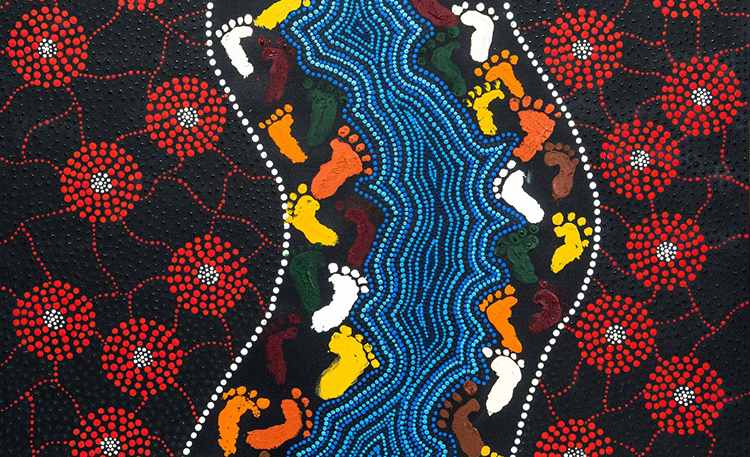“Reconciliation isn’t a single moment or place in time. It’s lots of small, consistent steps, some big strides, and sometimes unfortunate backwards steps …” – Karen Mundine – Chief Executive Officer, Reconciliation Australia
At its heart, reconciliation is about strengthening relationships between Aboriginal and Torres Strait Islander peoples and non-Indigenous peoples, for the benefit of all Australians.
It’s an ongoing journey that reminds us that while generations of Australians have fought hard for meaningful change, injustice for First Nations peoples is still widespread, and future gains are likely to take a lot not more effort.
So consider the role could your organisation could play in taking important steps forward in the national reconciliation movement.
Reconciliation Australia’s ‘Reconciliation Action Plan’ framework provides organisations with a structured approach to supporting reconciliation and achieving your staff and volunteers to work towards a more just, equitable and ethical organisation.
What is a Reconciliation Action Plan (RAP)?
A RAP is a strategic document with practical plans for action. It sets out how an organisation is committing to contribute to reconciliation with Aboriginal and Torres Strait Islander peoples.
The RAP Program helps advance the five dimensions of reconciliation by supporting organisations to develop respectful relationships and create meaningful opportunities with Aboriginal and Torres Strait Islander peoples.
RAPs are making a difference across Australia in workplaces, universities, schools, government and community organisations. This collective action is creating the right environment for Aboriginal and Torres Strait Islander peoples to access sustainable employment and business opportunities.
Over 120 NFPs across Australia already have a RAP – but that leaves many thousands that are still to take this step. Take a look at all the organisations currently implementing their RAPs and helping drive change across all sectors and regions of Australia.
Why develop a RAP?
RAPs provide a structured, nationally recognised, tried and tested model for your workplace to formalise commitments to reconciliation. They help to foster a community of shared value, goals and a common language when it comes to reconciliation.
By developing a RAP, your organisation can turn good intentions into positive actions and join the collective action for reconciliation. This means your NFP will be part of the steps forward — actively helping to build higher trust, lower prejudice, and increased pride in Aboriginal and Torres Strait Islander cultures.
Finding the RAP that’s right for your organisation.
There are four types of RAPs for workplaces: Reflect, Innovate, Stretch or Elevate. This means that there’s a RAP designed to suit your organisation at every stage of its reconciliation journey.
Reflect RAP – Scoping reconciliation
A Reflect RAP clearly sets out the steps your organisation will take to scope and develop relationships with Aboriginal and Torres Strait Islander stakeholders, decide on your vision for reconciliation and explore your sphere of influence, before committing to specific actions or initiatives.
Examples of Reflect RAPs:
- Teach for Australia — December 2019-December 2020 Reflect Reconciliation Action Plan
- Diversity Council Australia — July 2019-July 2020 Reflect Reconciliation Plan
Innovate RAP – Implementing reconciliation
An Innovate RAP outlines actions that work towards achieving your organisation’s unique vision for reconciliation. Commitments in this RAP allow your NFP to be aspirational and innovative to help your organisation gain a deeper understanding of its sphere of influence, and establish the best approach to advance reconciliation.
Examples of Innovate RAPs:
- Beyond Blue – April 2020-April 2022 Innovate Reconciliation Action Plan
- Autism Spectrum Australia – March 2020-March 2022 Innovate Reconciliation Action Plan
Stretch RAP – Embedding reconciliation
A Stretch RAP is focused on implementing longer-term strategies and working towards defined measurable targets and goals. In Stretch RAPs, organisations are required to embed reconciliation initiatives into business strategies to become ‘business as usual’.
Examples of Stretch RAPs:
- The Smith Family – July 2017-June 2020 Stretch Reconciliation Action Plan
- Oxfam Australia – August 2017-August 2020 Stretch Reconciliation Action Plan
Elevate RAP – Leadership in reconciliation
Elevate RAP organisations have a strong strategic relationship with Reconciliation Australia and actively champion initiatives to empower Aboriginal and Torres Strait Islander peoples and create societal change. Organisations are also required to have greater transparency and accountability through independent assessment of their activities.
Examples of Elevate RAPs:
- ABC – July 2019-June 2022 Elevate Reconciliation Action Plan
- The University of Melbourne – April 2018-December 2022 Elevate Reconciliation Plan
Getting started on your organisation’s RAP:
Reconciliation Australia supports over 1,000 organisations across Australia to develop, implement and review RAPs. There are two quick actions that will get your NFP started on its RAP journey today:
- Download this guide on the RAP Development Process, which sets out the steps for developing a RAP and will help you identify what’s involved in each stage.
- Register your interest with Reconciliation Australia by clicking here. Once you register, you’ll receive the relevant templates and resources you need to start drafting your RAP.
So what are you waiting for? Help your organisation to take the first step towards justice and reconciliation with Aboriginal and Torres Strait Islander peoples, right now.
Image courtesy of Reconciliation Australia. Staff and stakeholders in both the Sydney and Canberra offices contributed to two pieces of artwork as part of National Reconciliation Week celebrations. These artworks were used in the Reconciliation Australia RAP document and both hang in the respective offices. The artwork shown above is in the Sydney office, and is reproduced here with permission.
Related Posts



